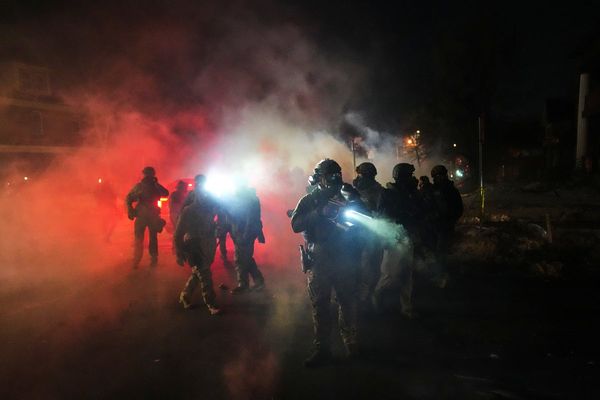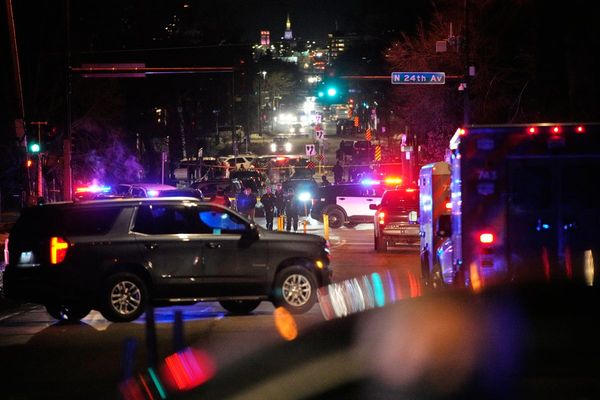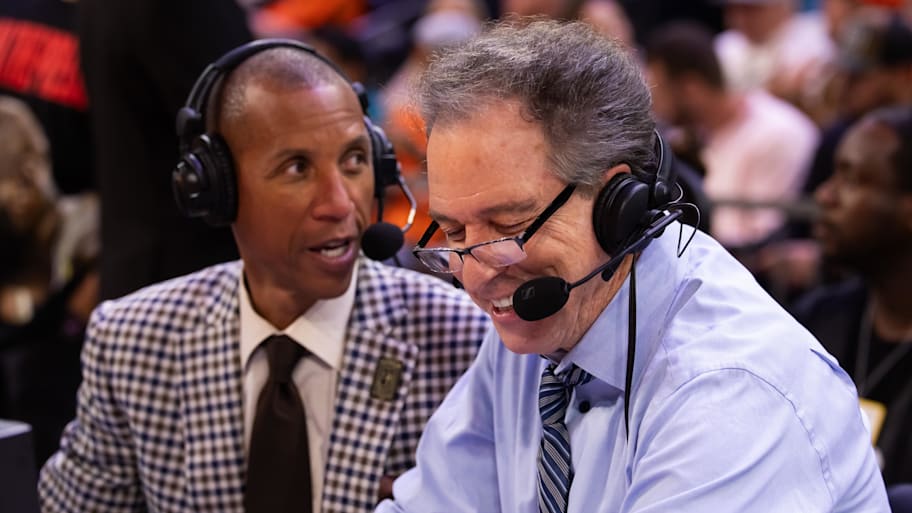
This Q&A first appeared on Open Floor, Sports Illustrated’s free NBA newsletter. Subscribe today to get exclusive content from Chris Mannix twice per week.
Kevin Harlan has been calling NBA games so long, his broadcasting career began in a city that no longer has a team. In 1982, Harlan, fresh out of the University of Kansas, was hired as a voice of the Kansas City Kings, tasked with calling Cotton Fitzsimmons’s fast-paced team that was winding down its final years in the Midwest before an eventual move to Sacramento. That began a 38-year run in NBA broadcasting that Harlan thought may have been over after last season, when Turner Sports, Harlan’s home for the last three decades, wrapped up its run.
“It felt like if this is the end, it feels like a natural end,” says Harlan. “I was ready to put a period [on NBA broadcasting] because I didn’t know.”
NBA broadcasting, though, wasn’t done with Harlan yet. When the season opens this month, Harlan will be back on the sidelines calling games for Amazon Prime Video, the league’s newest broadcast partner, which will stream 66 games this season. Harlan sat down with Sports Illustrated to discuss the end of the NBA on TNT, the decision to link up with Amazon and what Harlan is looking forward to this season.
Interview lightly edited for clarity.
SI: So did you ever think you would be calling games for a website that, if you are like me, you probably ordered a lot of shampoo from?
Kevin Harlan: Well, I haven’t but my wife has. I’ve watched her do it. My first broadcast was when I was 14 in high school in 1974, and back then that was a student-run radio station at our high school in Green Bay, Wisconsin, 10 watts, but it covered about 10 miles in all directions. And that was my first on-air experience. And did that through high school, then college and so on. But never in my wildest imaginations, like all of us, did we ever think what we would see from the internet explosion and where that would lead in terms of streaming.
It is a strange world. Even cable back when it emerged back in the ’80s was like, “Now what is this? It’s not … you don’t get it with rabbit ears on top of your TV? You get it through, what, cable? What is that?” So we’re in that same world, it seems like right now.
SI: We knew the end for TNT was coming for a while. But it was a long walk to get there. What was that like?
KH: It was a long walk to the very end and the finish line. And when the playoffs began last year, I don’t think it had immersed itself in all of our hearts and minds that this was the final run. It was the beginning of the playoffs. We were all so excited for it. But we knew that with the Eastern Conference finals, it would come to a close. And literally as every game passed, the cameramen, the technicians, the audio people, the people in the truck, the graphics people, all these hundreds of people who are so important for these broadcasts to look and feel and sound the way they do, knew that that deadline was coming closer with each passing broadcast.
And you felt the dread coming up. A lot of these people had been at Turner, like me, for decades, most over two decades. And they didn’t have anything on the horizon. They were hoping they could latch on with whoever. They were hoping they could stay with TNT, but nothing was set. It was for a lot of us, the unknown was creeping up faster and faster with each turning day of the calendar.
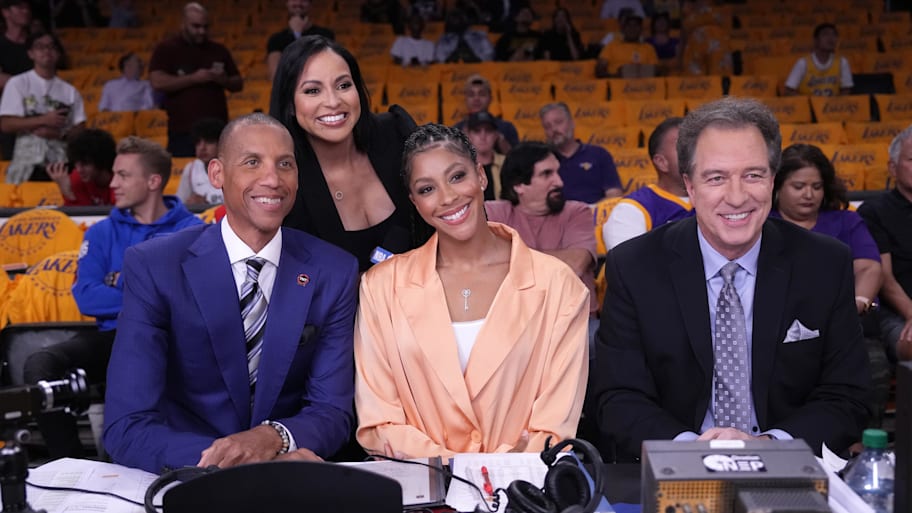
So those last couple broadcasts were difficult. And there were tears behind the scenes off the air after and before games, a lot of hugs. I was there for 30 years, when you’re a part of something that long, these people become your family outside your family. And while we have got a big family ourselves personally, with grandchildren now, those people that you would see every Tuesday or Thursday or both and then through the playoffs became friends and became colleagues and became more than just a guy that handled the camera or worked on the audio or strung the cable or typed the graphics.
But as I reflected on it this summer, I would tell you that nothing but wonderful memories in my heart, and smiles, and good thoughts about what was. And as they tell you sometimes at graduation to parents and grandparents and the kids who are getting those diplomas, Don’t cry because it’s over, smile because it happened. And that clearly is my headspace right now. So honored that I was a part of all those games those years and the companionship I had with those other people.
SI: How does Amazon enter the picture?
KH: I had visited the year before with NBC and all the wonderful people there, and it’s a historically good crew that they have assembled with their Olympic and their NFL coverage and all the things they do so well. And there was some conversation. But I’ve had almost a three-decade relationship with CBS, and I’m not sure how comfortable CBS was with that new possibility. But they were good about it and they didn’t put a period on it or a stop sign. They said, “This is something we’ve got to think about.” So I really didn’t think much about it, quite frankly, until the fall.
Then Prime came involved shortly thereafter, and that made sense to CBS. And they were incredibly kind and great to begin that relationship with. And then I said, “Could you just send me a schedule of what it would look like?” I had printed it out. And my wife said, “Can I see that schedule for a second?” And I said, “Sure.” So she grabbed the schedule and she goes, “You have a pen?” I said, “Yeah.” And she began to say, “Eh,” and crossing out some of these games. So I said, “Well, I don’t know that they’re going to go for this. I don’t know why they would go for this, but I get it.”
We sent it back to him and said, “I’m so honored that you’d want me a part of your crew. But I’m at that stage where I’d love to back up a little bit.” I’ve had this conversation with [ABC’s] Mike Breen a lot, about when to put that type of feeling on your schedule. And this was a natural place at the end of Turner and the beginning of these other ventures to maybe do that. And we didn’t hear anything for a week. And I said to Annie, I said, “You know, they may look at this and go, What’s this all about? This makes no sense. We need more. We need a full commitment.” And it is a commitment, but it’s just not maybe the body of games and everything that I’ve had in the past.
And for the life of me, they said, “Yes, this works. We’d love you to join.” And I said, “I’m beyond honored to join. And thank you for realizing where I am now and what I’ve done in terms of a very busy schedule, loving to back off a little bit.” And they accepted that. And it’s been nothing but just bliss dealing with the people there, how great they’ve been so far.
SI: I get asked a lot about the challenges of covering the NBA and boxing. My answer is, I legitimately don’t know anything about anything else. You have the challenge of needing to be up to speed on the NFL and the NBA every week. How do you do it?
KH: I have a daily routine and a weekly routine. And that is what I hang my hat on when I do feel overwhelmed. And I think any of us who are in the business know the responsibility that is in front of us, whether you’re covering the NBA or boxing and writing for the historically great SI. I guess you feel like you begin with a schedule and a routine, which I’ve tweaked over the years from day to day in what I do every day, but I do something every day.
I did the Monday night game in Jacksonville for Westwood One a couple days ago between the Chiefs and Jaguars. And on the flight home, I’m watching the game that I had done Sunday in Seattle with Tampa Bay and the Seahawks. And giving my, I call it, my first watch. And I critique that game and type notes just watching it but not grading it. I try to type my boards for the next two games I’ve got coming up. I try to read and get a headstart on my stories. That’s on the Tuesday flight home. Tuesday night has a certain feel to it. Wednesday, I do the same thing Wednesday with another set of things I’ve got to get done. Same with Thursday, Friday.
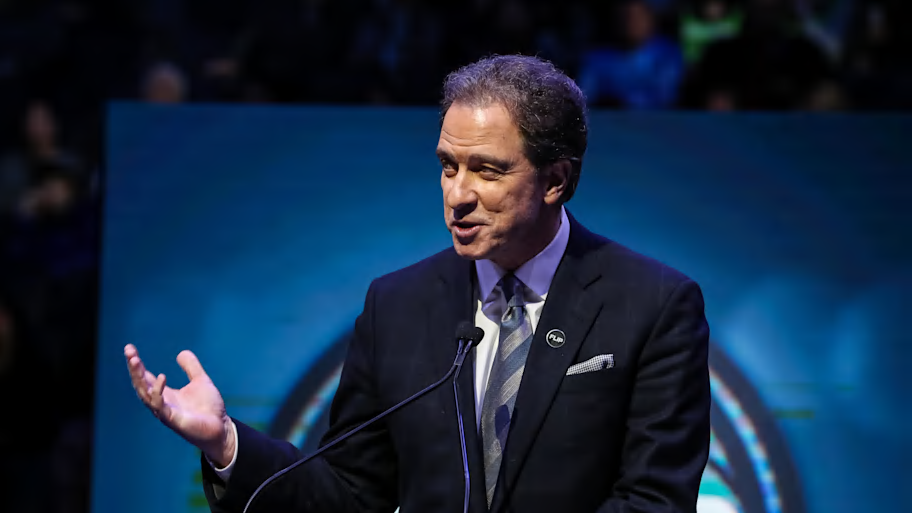
And by Saturday, hopefully that schedule and routine has led me to being very comfortable on my flight to the game. I’m reading the final couple stories, putting the finishing touches on my board, watching tape again of the two teams I’m doing, which I try to do all week long, final grade in my fourth quarter of the game that I’ve done it. I break my game down to doing the first quarter one day, second quarter the next, third, fourth. And so, by the time I land in that city, I’ve got my stories read, my board’s finished, I’ve critiqued my work, I’ve made my grade sheet, and I’ve watched enough tapes, so that when we have our production meeting Saturday night, it’s nothing but just, “Oh yeah, I remember that.”
Now the boards for radio are a lot different than my boards for TV. TV, it’s just massive and notes and all things that will accent the picture. Radio, it’s basically the Xs and Os, who’s playing numbers, who’s not playing, why are they playing. Five storylines for each. There’s not enough room to really get all this stuff out anyway. And I’m working with a Hall of Fame quarterback in Kurt Warner. But every day has a purpose. And if I ever get off or behind on those days, I do wrestle in bed at night getting to sleep thinking, Why didn’t I get that done? Now I’ve got to double up on this tomorrow. And so staying on track is huge for me. And an answer to your question, that’s what keeps me on mark, on pace for what needs to be done. Every day has a specific meaning.
SI: Having worked with a lot of different play-by-play guys, I have a profound respect for your preparation.
KH: In this business, the one thing that really matters is how did the call sound? How was the touchdown called? What was the interception like? What did you do in that moment? And you can have all these notes and all these things written down. At the end of the day, you’re going to be judged on the call. What did you say in that moment that really mattered? We’ve become a lot of highlights now with social media and everything else, and that’s how a lot of the people digest these games. So the call in those big moments, you hope that all the preparation that you’ve put into it leads to the right words at the right time on that big play.
Gregg Popovich has that famous framed picture on the hallway that the Spurs go past as they go out onto the floor. It’s the story of The Stonecutter in Romania, and there’s a boulder that’s ended up in the middle of the road. And, well, we got to move the boulder. Well, we got to chop it and we got to chip at it and we got to do it that way. So they begin chipping away. And it’s not the first swipe of the hammer, it’s not the 10th, it’s not the 1,000th, it’s maybe the 9,999th hit of that chisel that broke it in half. It wasn’t the first, it wasn’t that last hit, it was all the ones that led to that big final whack of the hammer on the chisel. And that’s how broadcasting these games is. You hope that all your setup all week long and on Sunday, and all the preparation you’ve put in, leads to that final hammer hit of that chisel that breaks that rock in half. And you know that it was all the things leading up to that that led to that rock being parted. And people can now get through the road. And you’re hoping that happens on your broadcasts.
SI: I’ve noticed you throw your whole body into a big call.
KH: John Madden told us this when we’re back with Fox in the mid-’90s—and I forget if it was to a group or I was in a smaller group, but I heard it with my ears. He said, “When I first got to CBS, I wasn’t the Madden that they were expecting, and I needed reps and I needed to learn my comfort zone.” He said, “One of the producers said to me one time, he goes, ‘John, when you were on the sideline, you were so demonstrative, you were so animated, your body was into everything that you said and wanted to get across to your players. I don’t know that you’re doing that during the broadcast.’” And John Madden said at the time, “When I began to use my hands more and thought about not worrying about what people thought in the booth but just was myself and was animated and everything, that’s when I became who I became.” And I’ve always remembered that little story.
SI: What’s the NBA storyline you’re most excited about?
KH: There’s a lot. I won’t bore you with a full list. I’m really excited to see what Denver does, because they’re clearly in that window of, Let’s cash in while we got these generational players, including one of the best centers of all time. Let’s continue to feed the beast here. But Oklahoma City, to me, continues to be just like they’ve done it in a small market with a genius, a general manager. He’s done it again, Sam Presti has. The coach is forward-thinking and defensive-minded and adjustment-prone, and all these things are what you need in your coach and a young voice to that team.
More NBA on Sports Illustrated
Listen to SI’s NBA podcast, Open Floor, below or on Apple and Spotify. Watch the show onSI’s YouTube channel.
This article was originally published on www.si.com as ‘Those Last Couple Broadcasts Were Difficult’: Kevin Harlan on the End of ‘NBA on TNT’.
